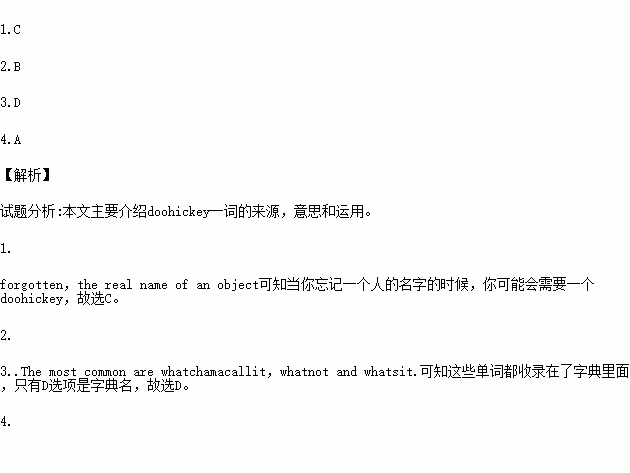题目内容
It has happened to all of us.You want to talk about an object,but you forgot the name of it.Or you never knew the name at all.Maybe you are not even sure there is a word for it.
For example,that thing, that you need to fix your bicycle.Or perhaps it is something you need for your computer·Or that part on your motorcycle that never,ever seems to work.
What are these things?
They are called“doohickies"·A doohickey is a word you use when you do not know,or you have forgotten,the real name of an object·
The MacMillan Dictionary defines doohickey as“something such as a small object or tool that you cannot remember the name of"·The American Heritage Dictionary says it is“something,especially a small device or part,whose name is unknown or forgotten".
Language experts say the word first started being used in the United States in the early 1900s· But other experts say they have seen examples of words like that in writings from the middle 1800s.
The Merriam-Webster Dictionary for Learners of American English gives this example of how native speakers might use doohickey:“I need one of those doohickeys,you know,with the long handle.”
Merriam-Webster adds that doohickey may be a combination of two other words:“doodad" and“hickey" .Strange as it may be,both of these words mean the same as doohickey.The dictionary lists a lot of strange words as.synonyms for doohickey.The most common are whatchamacallit,whatnot and whatsit.
You will probably never see these words in official documents or newspaper reports·But you might hear them in informal American English,when people are talking to each other·
“Hey,what does this doohickey do,anyway?”
"Dude,bring me that thingamajig,willya·”
"Janine,can you get me one of those whatchamacallits?”
Most Americans will know what you are talking about if you use one of those words.Just point at the object,use one of these words,and they will bring it to you·
1.When people need a doohickey it means they need something__·
A.which can be used to repair a bicycle
B.which can be used to fix a computer
C.whose name is forgotten
D.whose handle is very long
2.The words similar to doohickey were most likely to be seen in__for the first time.
A.1800 B.1850 C.1900 D.1950
3.You are sure to find the word whatchamacallit in__
A.the Macmillan Dictionary
B.the American Heritage Dictionary
C.an Official document or a newspaper report
D.the Merriam-Webster Dictionary for Learners of American English
4.The above,passage is mainly about__·
A.a special word
B.American English dictionaries’
C.the development of American English
D.the way to learn and use American English
 天天向上一本好卷系列答案
天天向上一本好卷系列答案 小学生10分钟应用题系列答案
小学生10分钟应用题系列答案
